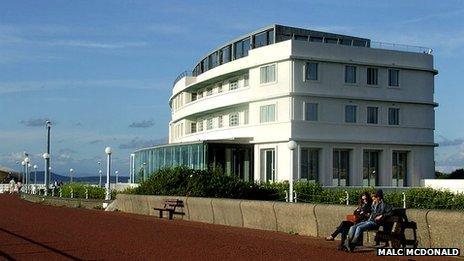Seaside towns reinvent themselves to buck gloomy trend
- Published

The Midland Hotel has helped revive Morecambe say tourism chiefs
Seaside towns in parts of the UK are stuck in a cycle of poverty with "severe social breakdown", according to a report by a think tank set up by the government.
The Centre for Social Justice's report found some resorts were "dumping grounds" for groups such as ex-offenders and children in care and had high unemployment rates and benefit bills.
In many cases they have been in a downward spiral since the rise of foreign holidays in the 1970s. But some coastal towns have managed to buck the trend, reinventing themselves by diversifying or making a concerted attempt at visible improvements.
The BBC News website looks at two English resorts where the outlook has become brighter.
Morecambe
Despite its enviable views across the bay to the Lake District, the seaside town of Morecambe was once regarded as the poor relation to its gaudy cousin Blackpool.
Yet it has been transformed in recent years, partly thanks to the success of the Art Deco Midland Hotel, restored to its former glory as by developers Urban Splash.
Morecambe welcomed 3.6 million visitors last year, up two-thirds on the doldrums of the mid-1990s, when just over a million people ventured to the resort.
Gavin Graham, deputy manager at the Midland Hotel, said it had grown year on year since reopening five years ago.
"Morecambe reaps the benefits of having the hotel," he said. "We've had a very busy July because of the weather. It has brought people to the seaside.
"Sometimes it's difficult to determine who are day-trippers and who are locals enjoying the sun."
The hotel's 80th anniversary of the original opening was celebrated in July. More than 100 people had afternoon tea on the hotel's sun terrace as part of a fundraising event.
But there is not a lot more to the town, he admits, other than the promenade and the statue of legendary comic performer Eric Morecambe.
'Tat shops'
Lancaster City Council's head of regeneration, Andrew Dobson, said research had shown Morecambe Bay was a very strong and valued brand, although visitors still found aspects of the town disappointing - such as the shops.
"We have some tired and old fashioned tat shops," he said. "They will simply have to go. We have some good quality individual shops but they are spread out. We've got to help innovative businesses."
But Mr Dobson said the rot had stopped and visitors enjoyed the festivals, walking along the promenade, seeing the Eric Morecambe statue or visiting the hotel. The next phase of the regeneration is focusing on shops and housing.
Funding has been secured from the government to regenerate the West End of Morecambe, which has suffered from poor housing.
"What we've realised is that there are no panaceas for regeneration, we have to work with our existing offer," he said.
Bridlington
Across the country in East Yorkshire is Bridlington, with its sandy beaches, harbour and a priory celebrating its 900th anniversary. Yet it also has issues - traffic congestion, a need to improve the economy and tackle health inequalities.
But the town has enjoyed a renaissance similar to Morecambe's, led by the influence of artist David Hockney.
Such is the influence of the popular artist that an official Hockney trail has been created by tourism agency Welcome To Yorkshire with the artist's agreement.

Artist David Hockney is inspired by the landscape of the Yorkshire Wolds
Gary Verity, chief executive of Welcome to Yorkshire, said: "We are truly blessed to have both David Hockney and the landscape of the Wolds in our county."
He said following a sell-out Hockney exhibition at the Royal Academy in London last year, the world went Hockney mad and the spotlight returned to Bridlington.
The trail's aim was to generate interest, intrigue and excitement in the county of Yorkshire and the Wolds landscape which inspired Hockney.
"We wanted to reclaim David Hockney from the Hollywood Hills and emphasise his Yorkshire roots, from Bradford where he was born, to Bridlington, where he now lives," Mr Verity said.
The exhibition brought international attention and media coverage to the region. The lofty ambition is that one day the Hockney Trail may be as familiar to tourists as Constable country in Suffolk.
Visitors on the trail are encouraged to leave the main roads and explore the narrow roads and rolling hills. Some of the locations for Hockney's paintings and drawings are identified, but what the artist wants is for people to "really look at the landscape… brought alive by the changing seasons".
A long-term action plan has been adopted by the council for regeneration. In 2007, Bridlington won the White Rose Award as a tourist destination.
Yet challenges remain as a result of economic inactivity and wages being low. And the plan does acknowledge Bridlington's heyday as a seaside resort is "long past".
- Published5 August 2013
- Published11 February 2013
- Published4 February 2013
- Published8 June 2013
- Published18 April 2013
- Published20 September 2012
- Published16 January 2012